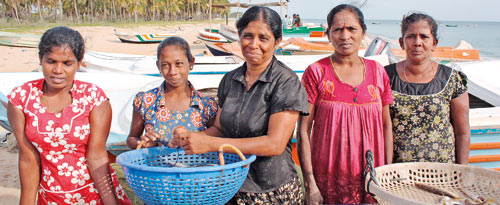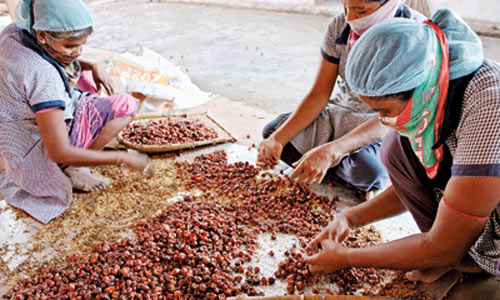War-time Sri Lanka had efficient public officials in battered areas unlike many other countries in conflict

Smiling faces of beneficiaries.
When the International Labour Organisation (ILO) in late 2010 began preparing for a post-conflict rural economy development project in Sri Lanka’s war-torn northern region, it encountered many issues. Among them were disenchantment by locals, fear of the military presence, fear of taking initiatives, fear to speak and a general sense of despair and ‘where do we go from here” feeling. These thoughts were reflected in a presentation by Joe Connolly, ILO Consultant (Former, Chief Technical Advisor LEED Project) during a workshop discussion last week in Colombo to assess the Local Empowerment for Economic Development (LEED) 2011-2016 project in the Vavuniya,
Mullaitivu and Kilinochchi districts. “The question we were faced with was; how were we (the project) going to fit into this set up in this scenario (where there was despair and doom … no positive feelings),” he recalled, delving into the A-to-Z of a project that has been immensely successful (going by all accounts) and placed not only new-found confidence amongst its recipients but given them a new lease of life, particularly war widows, female-headed households and many other despairing adults.
The ILO team did what he described as a territorial diagnosis and institutional mapping which provided a kind of social mapping of the areas to ascertain the resources, land use, what industries were there prior to the war and whether there is a market for these pre-war industries. There were many distinguished speakers at this day-long event particularly for the morning session like W.D.J. Seneviratne, Minister of Labour and Trade Union Relations; Gotabhaya Jayaratne, Secretary Ministry of Labour and Trade Union Relations, Donglin Li, Country Director, ILO Country Office in Sri Lanka and Bryce Hutchesson, Australian High Commissioner.
Absorbing presentation
However it was when Mr. Connolly took the stage with a riveting description of the state of play in the North, the issues, the conflicts, laced with wit, humour and seriousness that the participants including many from the north, nearly 340 km away, followed with much interest (even though to some the language – English and spoken in an Irish accent – may have been unfamiliar). The ILO expert said they looked at whether the previous industries still had space in the new environment; could women work from home and if not what were the constraints; available infrastructure and the government’s plans for the region. In terms of manufacturing, there was little of no local material that could be used for example in the development of roads and rail.
Local contractors were not getting contracts because they didn’t have proper equipment. There were 41 NGOs involved in food security and livelihood development along with six UN agencies. “I have worked in many conflict areas (in other parts of the world) which are failed states and where there is state institution. However here (in the North) – this was not a failed state; it had strong state institutions with a strong public service. Walk into an area and the divisional secretary would be seen working out a ‘box’ as the building was under construction and he was able to give loads of data.”

One of the prejects.
Residents feared exploitation
Residents feared that with the advent of roads and rail, outsiders would exploit them. There was reason for this sense of despair. Even though money was pouring in, it was also pouring out (with the same vigour) with local communities not reaping the benefits. Space to create avenues for local incomes wasn’t there. Fast-moving goods were flooding the market like TVs, washing machines and other movables but the benefits were going to Colombo-based companies. He said in one year Browns Group had 80 per cent of its (country -wide) business in the North but there wasn’t a single local dealer to show that local people had benefited.
So what did the ILO and its project staff do? “We began sensitising people to the situation. We looked at it in the context that if these issues were not addressed perceptions of inequalities will persist and trigger another war in 20 years similar to what happened in the South (1987-1990),” he said adding that they highlighted the North-South divide at many a forum. “We spoke of economic partnerships. We got people together. We looked at mutually beneficial partnerships. We looked at housing and whether the 60 to 70 million tiles that was required in the rebuilding process could be produced in the North instead of bringing them from the South.”
Mr. Connolly said cooperatives was an important part of this project. In most countries cooperatives have got a bad name as they are used for political purposes. “But there was a lot of potential and we tapped into this. Some of the biggest groups in the world started off as cooperatives just like New Zealand dairy’s Fonterra group. There are limitations but also great potential in cooperatives,” he said adding that their interest in cooperatives led to current laws in Sri Lanka governing cooperatives being reviewed to prepare a National Policy of Cooperatives.
Empowering women
Among other developments in the cooperatives environment in the North, women were invited to serve on the boards of cooperatives as active members. Earlier it was either men only or even if women were board directors, they were silent. “We wanted to ensure that women were economically empowered and that happens only when they have money in their pockets. You cannot talk to women about empowerment if they are broke,” he argued . Flagging another fundamental issue, he said among lessons learnt was that what would work in Colombo doesn’t necessarily work in Jaffna for instance.
He was echoing sentiments raised by V. Sivagnanasothy, Secretary – Ministry Prison Reforms, Rehabilitaion, Resettlement and Hindu Religious Affairs in the morning session where the latter cautioned that often international models (of development) may not work in areas where there is a strong local culture and situations differ. K. Marimuttu, Senior Vice President, Ceylon Workers Congress, speaking on behalf of trade unions while praising the project also noted that reconciliation should work in tandem with economic development projects. Impressed by the project, he urged the authorities to implement a similar project in plantation areas in the central hills where plantation workers “may be forced to switch to a rural economy”.
He was alluding to an unfolding crisis in plantations where production costs are much higher than revenue and/or profit owing to a combination of falling tea prices, fixed labour costs, mounting debt and protracted negotiations between plantation companies and the labour force over a new productivity-based model. Among the many benefits of the ILO project was being able to support more than 100,000 families with various income generation and employments related opportunities; supporting more than 35,000 individuals gaining direct employment and self-
mployments activities; more than 10,000 female headed households given access to direct and improved income generating opportunities; in the paddy sector alone, the income for the cooperatives and individual members exceeded US$1.5 million; income from exporting crops by individuals who were linked to various fruit and vegetable value chains exceeded $2 million; income from fisheries for individuals exceeded $1.5 million.
“As a result of these interventions, individuals who had no access to such income generating opportunities prior to the project, are now in a better position to invest in improving housing, give their children a better education, access to better health facilities and improved life styles,” a note on the project, said. -(Feizal)


